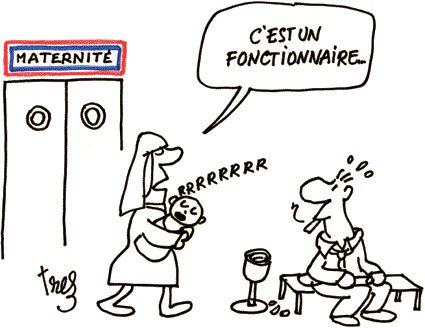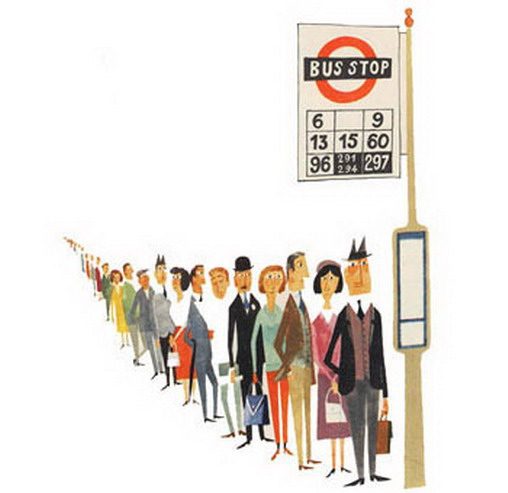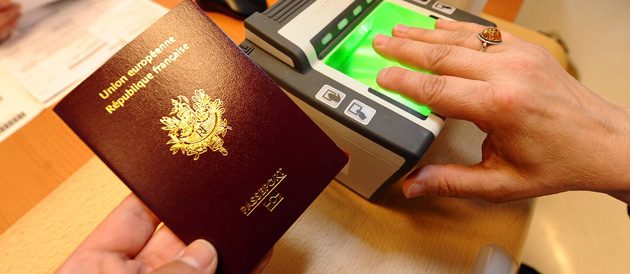Le Système D (Good old “System D”)
Having lived in the United States for almost two decades, I do not have frequent contact with the French Administration anymore. A few of years ago, I had to fly to San Francisco with my son, so we could renew our French passports. It is no small feat to obtain one of the state-of-the-art biometric passports, also known as “ePassports.” The Seattle branch of the French Consulate would not accept our paperwork as they did in the past. We had to go to California and make an appointment just to get the process started. Things ran smoothly and two weeks later, I received an email asking us to come in person to the Seattle office to pick up the passports. Once again, they requested for the whole family to show up. I did not want my son to miss half a day of school, so I approached the Seattle office. Their reply: “Non, ce n’est pas possible.” They were adamant he had to be there in person to sign his passport.
So many years after I left France, I instantly remembered what to do. I emailed our friendly contact in the San Francisco office, explained that Junior was testing at school that week (Oui, she remembered him very well,) and I begged for her help. She promptly emailed Seattle and asked them to make an exception. It worked: A few days later, I showed up sans Junior at the French American Chamber of Commerce offices downtown; signed a couple of forms; shook hands with the local representative of the French consulate, and left fifteen minutes later with both passports. “Ah,” I thought, sitting down in my car, “saved once again by good old Système D.”
“Say what?,” you ask. Système D. Throw this expression at any French person, and I guarantee they will start smiling and will even look at you approvingly. “Le Système D” is not mentioned in history books. It is not taught at school. Yet all French people seem to know about it. To understand what I am referring to, you have to know that life in my homeland involves a tremendous amount of red tape, and rules. “L’Etat,” (“the State”) is all powerful. L’Etat is “the permanent active force that runs the country (…) It defines culture and language, runs the economy, dispenses welfare and charity, redistributes wealth, levels differences, and defines and defends the common good.” [*]
To enforce rules and to keep the big machine running, l’Etat relies on special workers, les fonctionnaires (civil servants.) Who are they? Teachers, the police, hospital workers, firefighters, all civil servants in government offices, and all researchers in state institutes – an estimated 6 million state workers, or ¼ of the French working population. To become a fonctionnaire, one has to pass challenging exams and go through rigorous training. In the end, however, they get a job for life. These guys c.a.n n.o.t. be fired (at worst, they will get shuffled around from department to department, or from region to region.) They also get perks such as extended paid vacation and early retirement. It is easy to understand how other French people might resent them, when it can be so difficult to find or to keep a job in a slumping economy. To make things worse, there is an enduring cliché in France about les fonctionnaires: They are said to go for stress-free jobs and to be lazy and complacent. Illustrations.
 |
| Nurse: “This one is a fonctionnaire!” |
Even if I forget how frustrating it can be to live with French red tape, I am often reminded of this while reading books and blogs written by expatriates. Many are American and day after day, they tell of their epic struggles as they attempt to deal with French bureaucracy and tackle mundane tasks such as getting a phone line in their new apartment, opening a bank account, or (even more challenging) renewing their “Carte de Séjour” (residence permit) at the local government office, La Préfecture.
How do the French do it? Simple… almost. When dealing with bureaucracy, they come prepared, show patience, determination, and, above all, “Système D.” “D” stands for “se débrouiller” (verb) or “la débrouillardise,” (noun.) Using “le Système D” means to manage, to get by, to fend for oneself. In short, to show admirable resourcefulness in dealing with challenging rules and regulations. “Le Système D” is how the French get around the system.
This could be the end of our story. The conclusion would be: “When in France, do not fight rules and procedures. Before meeting the French Administration, come prepared, with all the required paperwork, get your information from several sources, be patient, and above all, find the right person, with the right rank, and convince them to help you—by whatever means possible.”
It would be fine. Some might even find this information useful, but we need to spice things up a bit. Life in France is a lot of things, but it is never, ever boring. The French may look as if they follow the rules, (even when bending them,) and ultimately go with the flow. Mais non. The French, my friends, are true enfants terribles.
Once in France, even the least observant visitor will notice that “Le Système D” may be invoked to justify questionable behavior. Example: French lines.
At the movies, at the supermarket, and above all at Disneyland Paris, American visitors are horrified by the scene unfolding before their jet-lagged eyes. In fact, it has been said that visiting Disneyland Paris is an excellent crash course on European culture and traditions. Good students? Northern Europe (The English, the Germans, the Dutch.) Bad students? Mediterranean countries (The French, the Italians and the Spaniards.)
Voilà the type of line many Americans are used to:
 |
| Nobody does lines like the British. They call this “a queue” |
Now let’s look at a French/Italian/Spanish line. Some refer to the French line as “a wedge.” I like to call it “a funnel”. No matter what you name it, this is what a French line looks like to foreigners:
 |
| French line or rugby mêlée? |
David Leibovitz, in his excellent book The Sweet Life in Paris, explains: In Paris, there are only two reasons you can cut in front of others waiting in line:
1. Because you are old, frail, or have a physical disability that prevents you from standing for long periods of time.
2. Because you don’t think you should have to wait in line behind anybody else.” [**}
In France, the same rules apply when lining up, when moving around public places, in the street, by foot or by car: One has to be prepared and can’t be too nonchalant about it. It’s a jungle out there, especially in Paris. When lining up in France, forget American space. Switch to French space. While waiting, do not stand politely two feet away from the person in front of you. Instead, stand very, very close. Use your grocery cart, your backpack or anything bulky to block the space.
If you don’t (because you are American and need that two-foot bubble around you,) you might notice someone sneaking up on the side and casually edging their way in front of you.
Cheaters? Mais, oui. You can try and say something (if your French is good enough.) Most times, the cheat will act surprised and finally look at you. “Oh, il y a la queue?” (“Is there a line?”) The rule here is: The cheat has not made eye contact with you through the whole process. As long as he has not *seen* you, you do not exist. Therefore, he is free to move around, and that includes cutting you off. When crossing the street in Paris, always make eye contact with drivers if you can. Do not step off the sidewalk until they have acknowledged you. It sounds awful (not to mention stressful) doesn’t it? It can be. But how does this relate to “Le Système D ?”
 |
| These guys would never make it to the ATM in France! |
When confronted, other cheats might shrug, smile and say: “Hey, Système D” as if congratulating themselves on their resourcefulness. When something is not allowed, it becomes a challenge to some of my countrymen: They have to try and bypass the rules. Cheating is inexcusable, and it bugs me as it bugs most French people. This is a typical case of “Système D” hijacking. C’est dommage.At its best, when used to survive daily encounters with French bureaucracy, “le Système D” is a good thing. The French, enfants terribles and rebels at heart, are true non conformists. Living in France has made them this way. I have often admired their creativity and resourcefulness. At its worst, “the Système D” is a real pain in the neck, and might make you feel like boarding the first flight out of the country tout de suite.
[*] Nadeau J. B., & Barlow J. (2003.) Sixty Million Frenchmen Can’t Be Wrong. Naperville, Illinois: Sourcebooks, Inc. Page 126
[**] Leibovitz David (2009.) The Sweet Life in Paris. New York, N.Y: Broadway Books. Page 77

Or click a link below to read the next (or previous) post...allons-y !
Join la Mailing List
Be the first to read stories and travel tips I don’t share anywhere else!
No spam, ever. That’s a promise. Visit the Privacy Policy.



